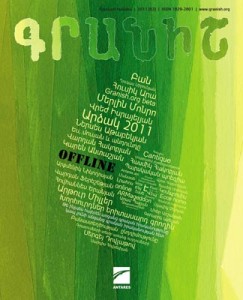 Armenian literature enthusiasts on Wednesday unveiled an upgraded version of their literary website that appears popular among reading aficionados and authors.
Armenian literature enthusiasts on Wednesday unveiled an upgraded version of their literary website that appears popular among reading aficionados and authors.
During the two years of operating the website, Granish, featuring the works by modern Armenian writers, has succeeded in finding its own reader on the worldwide web.
The project set up by a group of young writers and literary critics in 2009 has included the operation of a foundation, a club, and since last year also the publication of a literary magazine. The second issue of Granish in hard copy was also presented to the public.
The goal of the non-commercial project, according to its representatives, is to disseminate and popularize Armenian-language modern literature.
Member of the Granish literary club and founder of the website Karen Antashyan says that as a commencing writer he personally felt the need for such a web resource as only a few years ago there were virtually no means of delivering literary works to the reader.
“A few of us, young writers and critics, thought that while we devoted the bulk of our time to literature and creating literature, we should also think about a mechanism through which our works would become important for and demanded by society,” says the young writer, who adds that still a few years ago the Internet, as a major information resource, was in a relatively nascent stage of development in Armenia and there was no large content of Armenian-language literature out there.
According to Antashyan, many authors today prefer to go online through Granish, as the site daily has at least 500-1,500 readers from both Armenia and Diaspora communities.
“Whereas a few years ago many would say that we had no modern Armenian literature, then now there is no such question, as there is such a resource where one can learn about various authors and their works,” says Antashyan, adding that Granish is open to all writers without any age or genre restrictions.
Literary critic Arkemnik Nikoghosyan, who is also a member of the club, says that there is some literature of “high aesthetic standard” covering modern themes out there for readers.
Granish has so far had two issues – each published in about 500 copies.
Each issue covered a certain theme. The first one focused more on language, as it also included works by authors who use language elements seemingly unbecoming of “literature”. The second is called “Offline” as it includes the works by authors who have not been very often online.
“Granish is very dear to me, as it is being done by the young, which means that it must be brave… Besides, it offers another major hub in our literary field that gathers people together,” says writer Nerses Atabekyan.

